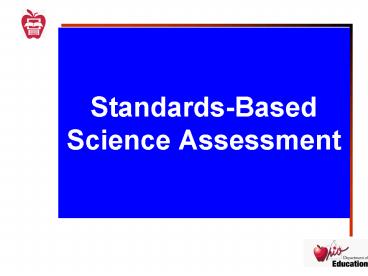StandardsBased Science Assessment PowerPoint PPT Presentation
1 / 20
Title: StandardsBased Science Assessment
1
Standards-Based Science Assessment
2
Ohios Science Cognitive Demands
Science is more than a body of knowledge. It must
not be misperceived as lists of topics to be
covered in the six standards in Ohios Academic
Content Standards, K-12 Science. Holistically,
science is a way of studying the natural world.
3
Cognitive Demand
Every Ohio achievement test item for science is
classified on the basis of what the item asks of
the student in terms of reasoning, evaluating
investigative procedures, understanding science
concepts or analyzing scientific information and
technological solutions
4
Cognitive Demand
Distributing items across the types of cognitive
demand ensures a balance of ways for students to
demonstrate science skills and understandings
5
Types of Cognitive Demand
- Recall / Identify Accurate Science
- Communicate Understanding / Analyze
- Science Information
- Demonstrate Investigative Processes
- of Science
- Apply Concepts / Make Relevant
- Connections with Science
6
Types of Cognitive Demand
- Recall / Identify Accurate Science
- Students provide and identify accurate
- statements about previously learned,
- scientifically valid facts, concepts and
- relationships
- Teachers use a variety of motivators to engage
- students thinking to help them access
- previously learned science knowledge and
- skills
7
Types of Cognitive Demand
- Communicate Understanding / Analyze Science
Information - Students analyze scientific information and
- communicate scientifically, given rich
investigative - scenarios and valid scientific data and
information - Teachers use questioning and science content
- knowledge and content-pedagogy to facilitate
- exploration of standards-based questions,
challenge - misconceptions and help students develop
scientifically - valid conceptions and explanations
8
Types of Cognitive Demand
- Demonstrate Investigative Processes of Science
- Students use scientific inquiry skills,
grounded - in standards-based science content
- Teachers integrate the teaching of standards
- for Scientific Inquiry and Scientific Ways of
- Knowing into opportunities for students to
- conduct investigations aligned with the
content - standards
9
Types of Cognitive Demand
- Apply Concepts / Make Relevant Connections with
Science - Students apply science in the context of
individuals and - society and scientifically analyze
consequences and - alternatives, given real-world situations and
- technological problem-solving scenarios
- Teachers integrate the teaching of standards
for - Science and Technology, Scientific Inquiry and
- Scientific Ways of Knowing into opportunities
to help - students contextualize and expand
understandings of - science content standards
10
Implications for Instruction
- Employing instructional strategies that allow
students a variety of ways to demonstrate their
science skills and understandings can improve
learning and performance on Ohios
standards-based assessments
11
Statewide Assessment
- Factors that affect student performance on
statewide assessment items - Student Ability
- Item Attributes
- Random Factors
12
OGT Spring 2005 Data
- Multiple choice item on which Ohio students
performed the lowest - Physical Science
- Recalling / Identifying Accurate Science
- 25 of students responded correctly
13
OGT Spring 2005 Data
- Multiple choice item on which Ohio students
performed the highest - Life Science
- Communicating Understanding / Analyzing Science
Information - 90 of students responded correctly
14
Student Performance
- Characteristics of Items that may Impact
- Individual Student Performance
- Standard and benchmark
- What content is covered?
- Format of item
- How is the information presented?
- Passage-based or not passage-based
- Multiple-choice, short-answer, extended-response
- Cluster-based or not cluster-based
- Cognitive demand
- What does the task require in terms of student
thinking? - Random factors
15
Student Performance on Spring 2005 OGT
Multiple-choice Items
16
Preliminary Analysis of Spring 2005 OGT Data
- Student performance on constructed response items
is significantly lower than performance on
similar multiple choice items - Student performance is not significantly
different across standards or benchmarks - Student performance appears to be impacted by
item cognitive demand
17
Preliminary Analysis
- Research suggests that student achievement is
positively impacted by - Teaching for transfer by providing students with
a variety of tasks - Varying the complexity of tasks and emphasizing
higher-order thinking skills - Teaching for mastery and helping students reflect
on their learning - D. W. Tileston. ( 2000.) Ten Best Teaching
Practices - R. J. Marzano. (2003.) What Works in Schools
18
Preliminary Analysis
- Research suggests that student
- achievement is positively impacted by
- Ensuring multiple exposure to, and complex
interactions with knowledge - Comparing classroom or individual student data to
statewide data to reveal gaps in instruction or
student experience - D. W. Tileston. ( 2000.) Ten Best Teaching
Practices - R. J. Marzano. (2003.) What Works in Schools
19
Cognitive Demand
How can understanding cognitive demand inform
classroom instruction to improve student
performance?
20
Aligning to the Standards
Click on the following links to learn more
about The Learning Cycle and Classroom
Inquiry Standards-based Science
Instruction Standards-based Science
Assessment Teacher Tools for Reflecting on
Teaching Science Student Tools for Reflecting on
Learning Science

